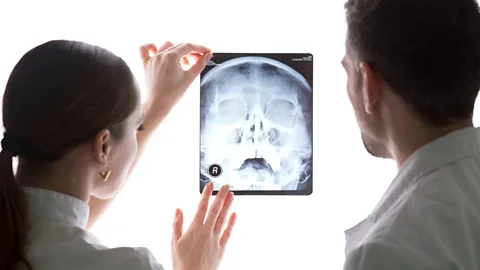By Alex ChristianFeatures correspondent

 Alamy
AlamyHeralded and decried in equal measure, artificial intelligence has already changed how we work now, and how we will in the future.
It has been just more than a year since OpenAI launched its chatbot, ChatGPT, yet the technology is already top of mind for most workers. In many cases, it's become a part of their daily routines.
AI has gone from feeling like an abstract idea to a familiar tool that can streamline workflows and generate new ideas. But not everyone has welcomed the technology, and instead see it as a threat to their very careers. It's a push-and-pull that's defined this year.
The biggest AI workplace trends of 2023 show how the technology has shaken up work as we know it. They also give us a peek into how AI might shape 2024, as the technology continues to evolve at lightning pace.
Workers are already depending on AI
Many employees have grown accustomed to using AI in their daily jobs for time-saving administrative tasks, particularly rudimentary writing and basic ideation. This is especially the case in knowledge-work positions, where AI shows potential to free up workers to do creative, more sophisticated tasks. (Some workers are even using the technology to write resumes and cover letters to get those jobs in the first place.)
But as more workers utilise AI, some employers are responding by curbing the technology's use in the workplace. This has included tacitly suppressing or outright banning access to tools like ChatGPT, with organisations worried about potential misuse or data leaks, says Simon Johnson, head of the global economics and management group at MIT Sloan School of Management, in Massachusetts, US.
Yet some employees who've come to heavily rely on the tools, whether for increased productivity or to get a leg up on colleagues, have had to backchannel to retain access. Social-media communities have even offered tips on how to secretly access the technology at work.

 Alamy
AlamyAI is evolving to target some office jobs
Many people assumed AI would most likely replace humans in roles that are easily automated: think the customer service chatbots and grocery-delivering robots already busy at work.
But as it has evolved in the past year, it's clear that it could impact more complex knowledge work roles once considered "safe". Some creative jobs are already being threatened. For example, text-to-image generative AI programs like Midjourney and Stable Diffusion can create dazzling illustrations and photorealistic renders in moments – work that's typically reserved for highly skilled commercial art teams.
Data shows there's validity to workers' worries. A March 2023 report from Goldman Sachs estimated that AI capable of content generation could do a quarter of all the work currently done by humans – equating to 300 million jobs lost across Europe and the US.
"This isn't somebody else's problem now. It's an issue for the white-collar office worker who is firmly in the middle class," says Mark Muro, a senior fellow at US economic think tank organisation the Brookings Institution, based in Washington, DC. "We don't know exactly how this is going to play out. Physical automation was a lot more predictable. This is less predictable."
But some jobs won't be replaced – yet
For all the fear, however, there are many roles and tasks that AI won't be capable of performing in the near future. That's particularly the case with jobs that demand soft skills, such as emotional intelligence and outside-the-box thinking.
Martin Ford, author of Rule of the Robots: How Artificial Intelligence Will Transform Everything, believes workers whose job it is to come up with new business strategies may be relatively safe from automation. He also predicts roles that require sophisticated interpersonal relationships – for example, nurses and business consultants – are hard for machines to replace. These are jobs, he says, that require "a very deep understanding of people. I think it'll be a long time before AI has the ability to interact in the kinds of ways that really build relationships".
Additionally, trade jobs that far pre-date digital work environments – such as electricians, plumbers and welders – are among the "hardest of anything to automate", says Ford. These jobs are less reliant on language-based tasks and typically require greater problem-solving ability, mobility and dexterity in unpredictable environments that machines cannot currently mimic.

 Alamy
AlamyWe're also going to work with AI
As AI becomes more ubiquitous, some experts believe the technology is actually more likely to augment – rather than replace – human talent. Joanne Song McLaughlin, associate professor of labour economics at the University of Buffalo, US, cites medical diagnoses as an example. While a robot may be able to detect cancer, for instance, most patients would prefer a qualified medical professional to break the news.
Workers are already utilising ChatGPT as a personal assistant, using it to draft emails, plan itineraries and project costs and timelines. More broadly, professionals are already using AI to help eliminate bias in decision making – some large corporations are already employing data-driven recruitment to test candidates' qualities, with behavioural insights matching them with the right vacancy.
And while AI will eliminate some jobs, it will also create new ones; for example, data engineers, governance specialists and a host of "training" roles.
Alongside much fear and uncertainty, there's optimism
AI may be the technology of the day, but it's far from the first to disrupt the workforce. Technology has advanced exponentially over the decades, from the rise of automation in mechanics, to office computers and wireless internet.
"Technology advancements have shown us that, yes, it has the potential to automate or streamline work processes," says Scott Likens, global AI and innovation technology leader at PwC, based in Austin, US. "However, with the right set of skills, individuals are often able to progress alongside these advancements."
Experts recommend that rather than worry about the threat of AI, it's more useful to think of it as a tool. The best tactic? Adapt, learn and lean into the technology, says Likens. "Education and training [are] key for employees to learn about AI and what it can do for their particular role, as well as help them develop new skills. Instead of shying away from AI, employees should plan to embrace and educate."
https://ift.tt/yGPmOvb
Business
Bagikan Berita Ini















0 Response to "Panic and possibility: What workers learned about AI in 2023 - BBC.com"
Post a Comment